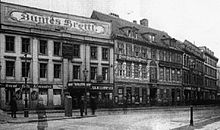Overboard

The " Überbrettl ", founded in 1901 by Ernst von Wolhaben in Berlin , was one of the first literary cabarets in Germany. There were comparable establishments in Paris before , the best known is Le Chat Noir by Rodolphe Salis on Montmartre . There, artists took the opportunity to show each other their latest pieces and numbers to see how they were received. This concept of cabaret worked as a counter-model to established art forms and thus corresponded very much to the spontaneous, socially critical attitude towards life, especially of the young generation of artists around the turn of the century (“ bohème ”).
History of origin
This atmosphere was also described by Otto Julius Bierbaum in his novel Stilpe in 1897 , which is said to have inspired Wolzo to create a comparable institution in Germany. As a name, Wolhaben, who had gained experience as a game director during his time in Munich, chose an ironic allusion to Friedrich Nietzsche's word about " Übermenschen " with "Überbrettl ", which at the same time should express that it is much more than a usual "Brettl" As they called small Tingeltangel clubs at the time , they wanted to stand out from the crowd through literary and artistic standards.
Wolzog opened his “Überbrettl” on January 18, 1901 at Alexanderstraße 40 opposite the then police headquarters at Alexanderplatz in the former Berlin Secession Theater under the name “ Buntes Theater ”. The poet Detlev von Liliencron worked at the establishment as a “literary headmaster”. The offer included numbers by Christian Morgenstern with a parody of Alfred Kerr , by Bierbaum and the one-act episode by Arthur Schnitzler . The musical director was the composer and conductor Victor Hollaender , among others Oscar Straus also composed for this cabaret. Initially, the cabaret, which was soon known throughout the city as the “colorful theater”, was a complete success, the performances were sold out. The ballads , skits and musical performances of "Überbrettl" found imitators in the year they were created, so that within a few years dozens of cabarets were created in back-room pubs in Berlin. The young Arnold Schönberg temporarily took over the musical direction of “Überbrettl” .
Encouraged by the overwhelming success of his cabaret stage, in the same year he rented unused theaters in the courtyard of Köpenicker Straße 68, which he had lavishly converted and equipped by the well-known Art Nouveau architect August Endell . The move to the house, which was then in the poor south-east of downtown Berlin, and the increasing competition quickly led the "Überbrettl" and the manager, who was not very experienced in business issues, into difficulties, which is why Wolzo said goodbye to the project in 1902, which soon lost momentum and up comedy productions turned.
In 1909, the newly founded Neue Freie Volksbühne eV temporarily moved into the halls, which after 1918 served various stages and finally as a cinema.
literature
- Roger Stein : Das deutsche Dirnenlied , 2006, pp. 124–127
- Peter Jelavich : Berlin cabaret. 2nd ed. Cambridge / Mass. / London: Harvard University Press, 1996.
Web links
- Arnold Schoenberg Center: Arnold Schoenberg in Berlin - "Überbrettl" ( Memento from May 6, 2002 in the Internet Archive )
